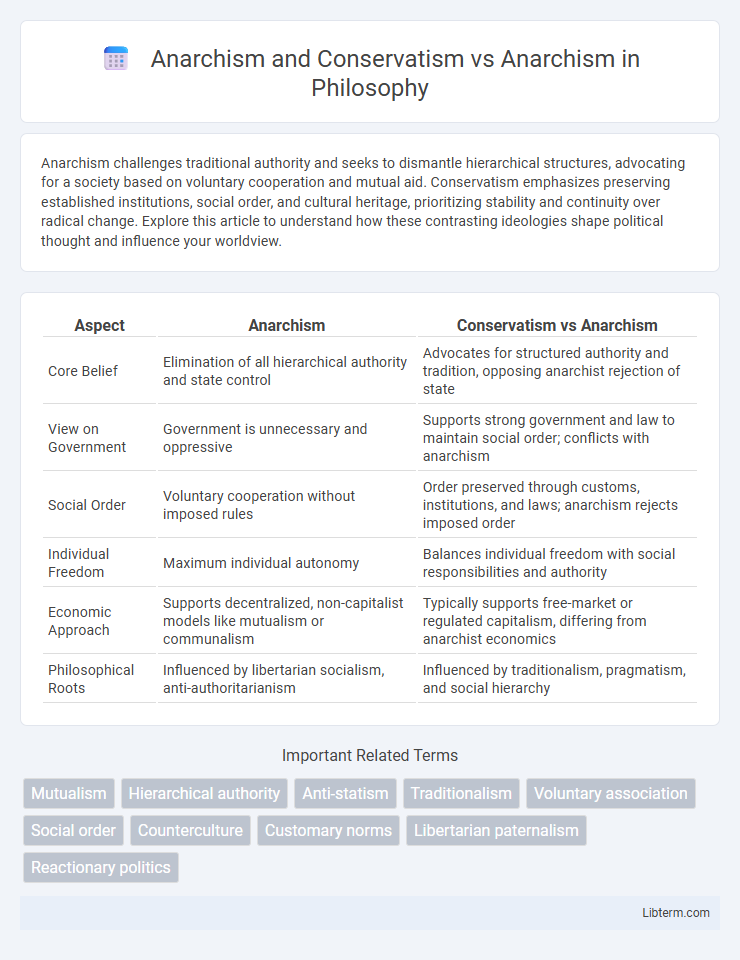Anarchism challenges traditional authority and seeks to dismantle hierarchical structures, advocating for a society based on voluntary cooperation and mutual aid. Conservatism emphasizes preserving established institutions, social order, and cultural heritage, prioritizing stability and continuity over radical change. Explore this article to understand how these contrasting ideologies shape political thought and influence your worldview.
Table of Comparison
| Aspect | Anarchism | Conservatism vs Anarchism |
|---|---|---|
| Core Belief | Elimination of all hierarchical authority and state control | Advocates for structured authority and tradition, opposing anarchist rejection of state |
| View on Government | Government is unnecessary and oppressive | Supports strong government and law to maintain social order; conflicts with anarchism |
| Social Order | Voluntary cooperation without imposed rules | Order preserved through customs, institutions, and laws; anarchism rejects imposed order |
| Individual Freedom | Maximum individual autonomy | Balances individual freedom with social responsibilities and authority |
| Economic Approach | Supports decentralized, non-capitalist models like mutualism or communalism | Typically supports free-market or regulated capitalism, differing from anarchist economics |
| Philosophical Roots | Influenced by libertarian socialism, anti-authoritarianism | Influenced by traditionalism, pragmatism, and social hierarchy |
Introduction to Anarchism and Conservatism
Anarchism advocates for a stateless society emphasizing individual freedom and voluntary cooperation, rejecting hierarchical authority and centralized government. Conservatism prioritizes tradition, social stability, and upholding established institutions to preserve cultural continuity and order. Comparing anarchism and conservatism reveals fundamentally opposing views on authority, social structure, and the role of government in individual lives.
Philosophical Foundations of Anarchism
Anarchism is rooted in the philosophical belief of individual autonomy and the rejection of all hierarchical authority, emphasizing voluntary cooperation and self-governance. Conservatism contrasts with anarchism by valuing tradition, social order, and institutional authority as essential to maintaining societal stability. The philosophical foundations of anarchism challenge the legitimacy of centralized power, advocating decentralized structures based on mutual aid and egalitarian principles.
Core Tenets of Conservatism
Conservatism emphasizes the preservation of traditional institutions, social order, and cultural continuity, advocating for gradual change rather than radical disruption. It values established hierarchies and authority as essential for stability and often supports property rights and rule of law. In contrast, anarchism fundamentally rejects hierarchical structures and state authority, seeking a society organized around voluntary cooperation without coercive institutions.
Historical Origins: Anarchism vs. Conservatism
Anarchism originated in the 19th century as a radical critique of hierarchical authority and state power, influenced by thinkers like Pierre-Joseph Proudhon and Mikhail Bakunin, emphasizing individual freedom and voluntary cooperation. Conservatism, emerging in the late 18th century amidst the French Revolution, sought to preserve traditional social orders, institutions, and customs, guided by figures such as Edmund Burke who valued stability and gradual change. The historical divergence lies in anarchism's rejection of all structured authority versus conservatism's defense of established hierarchies to maintain social cohesion.
Authority and Hierarchy: Contrasting Views
Anarchism rejects authority and hierarchy as inherently oppressive, advocating for decentralized, voluntary associations that promote individual freedom and equality. Conservatism supports established authority and hierarchical structures, viewing them as essential for social order, stability, and continuity. The conflict between anarchism and conservatism centers on their fundamentally opposing views of power distribution and governance legitimacy.
Individual Freedom in Anarchist and Conservative Thought
Anarchism emphasizes absolute individual freedom by rejecting all hierarchical structures and advocating for self-governed, voluntary associations without state interference. Conservative thought values individual freedom within the framework of established institutions and social order, prioritizing stability and tradition to preserve communal well-being. The tension between anarchism and conservatism centers on whether individual freedom is best realized through radical decentralization or maintained through structured governance and cultural continuity.
Social Order: Anarchist Critique vs. Conservative Defense
Anarchism critiques social order as an imposed structure that restricts individual freedom and perpetuates inequality, advocating for voluntary cooperation without hierarchical authority. Conservatives defend social order as essential for maintaining stability, tradition, and moral values that bind communities together and prevent chaos. The fundamental clash lies in anarchism's rejection of imposed authority versus conservatism's emphasis on preserving established institutions to ensure societal cohesion.
Economics: Property, Capitalism, and Redistribution
Anarchism challenges traditional property rights by advocating for collective ownership or the abolition of private property, opposing capitalist structures that concentrate wealth and power. Conservatism defends private property and free-market capitalism as essential to economic stability and individual liberty, resisting redistribution efforts that disrupt social order. Economic redistribution is embraced within anarchism as a means to achieve equality, whereas conservatism views such measures as threats to individual incentive and economic growth.
Modern Debates: Anarchism in Contemporary Conservative Discourse
Modern debates highlight how anarchism is often portrayed in contemporary conservative discourse as a threat to social order and stability, emphasizing its association with anti-government protests and radical activism. Conservatives criticize anarchism for undermining legal institutions and promoting chaos, positioning it as antithetical to traditional values and state sovereignty. This framing contrasts sharply with anarchist perspectives that advocate for decentralized, non-hierarchical governance as a means to achieve genuine freedom and community autonomy.
Conclusion: Bridging or Deepening the Divide
Anarchism and Conservatism fundamentally differ in their views on authority and social order, with anarchism advocating for stateless societies and conservatism emphasizing tradition and hierarchical structures. The ongoing discourse between these ideologies either highlights irreconcilable contrasts or reveals potential areas for dialogue, particularly concerning individual freedom and community responsibility. Bridging the divide requires nuanced understanding and mutual respect, while deepening it risks further polarization in political and social thought.
Anarchism and Conservatism Infographic

 libterm.com
libterm.com